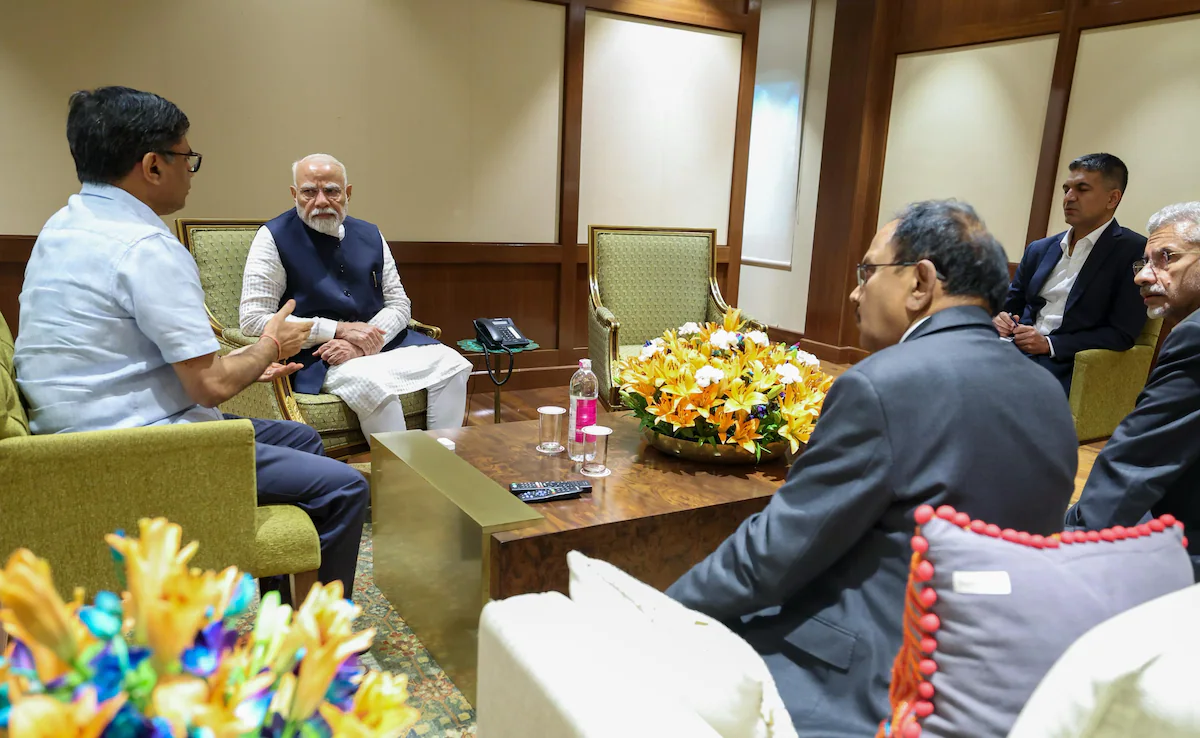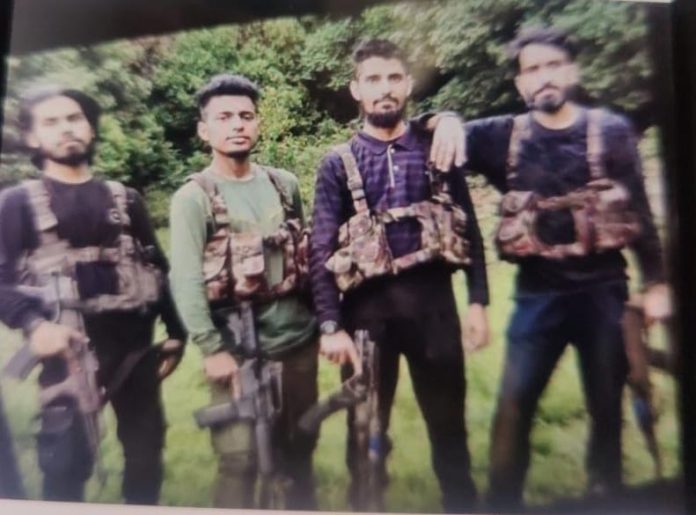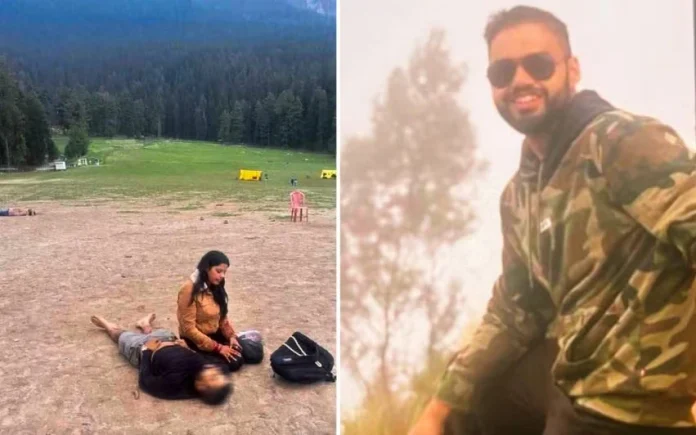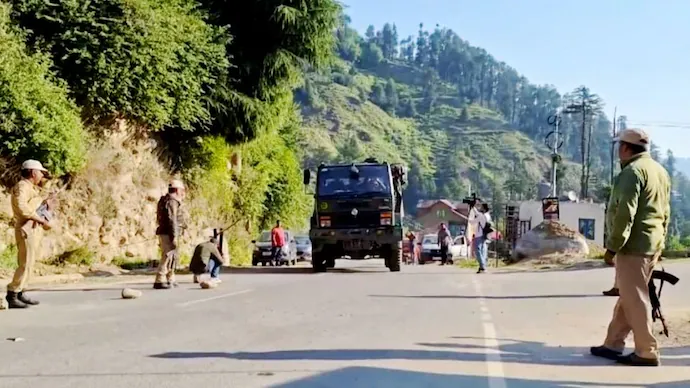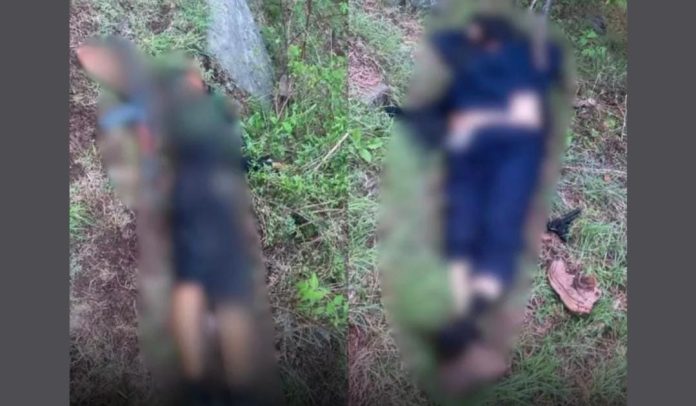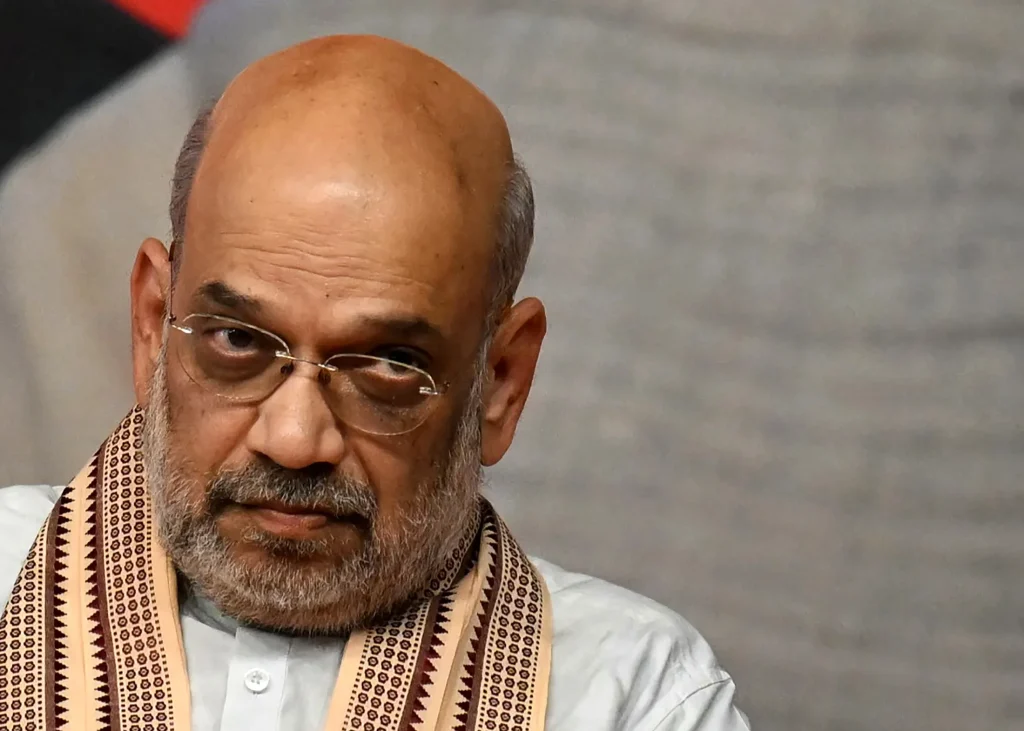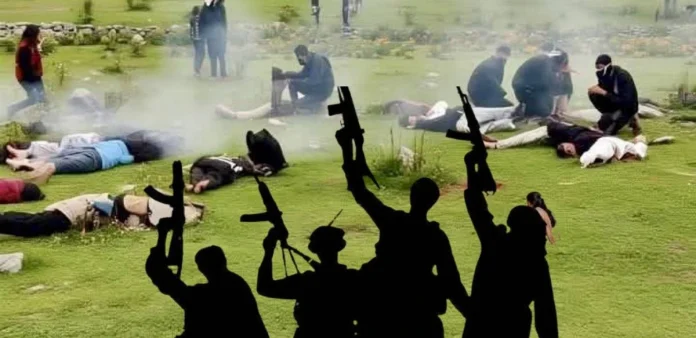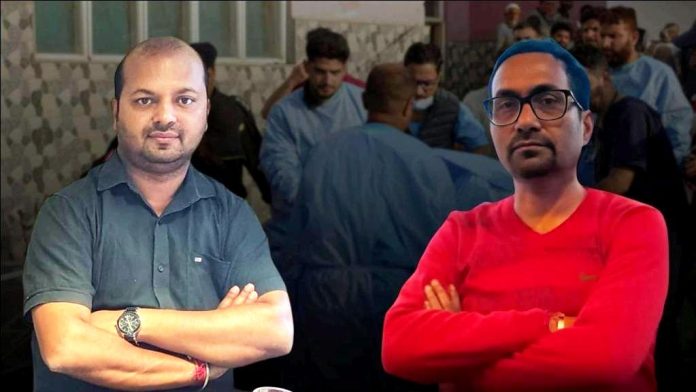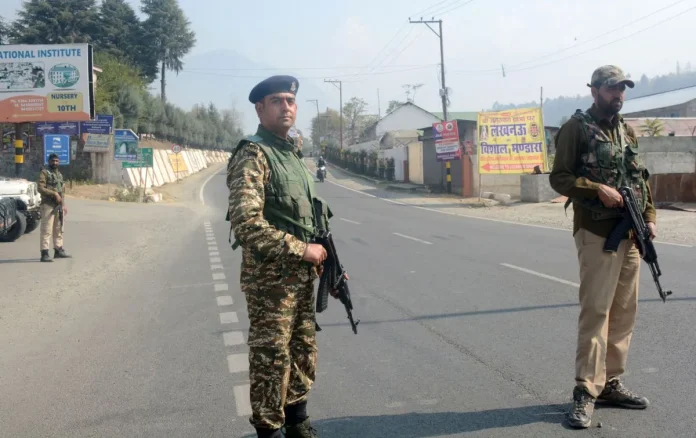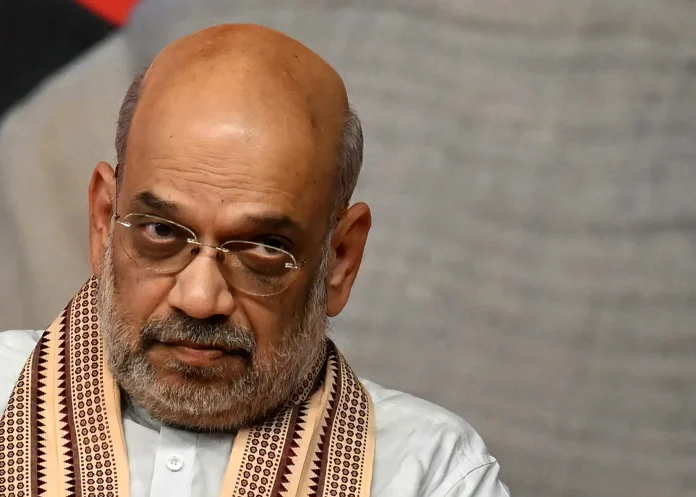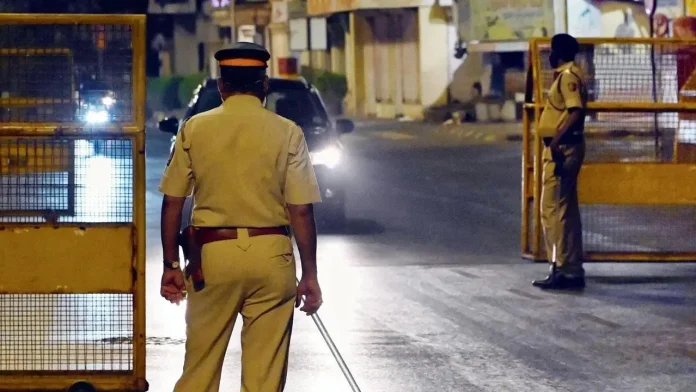पहलगाम में जान गंवाने वालों में शामिल थे ठाणे के तीन लोग, मौत से सदमे में हैं परिजन
Terror Attack in Jammu and Kashmir Pahalgam: जम्मू-कश्मीर के पहलगाम में मंगलवार को हुए आतंकी हमले में महाराष्ट्र के ठाणे जिले के तीन लोगों की मौत से उनके दोस्त और परिचित गहरे सदमे में हैं और वे अपने दर्द को शब्दों में बयां नहीं कर पा रहे हैं। इस आतंकवादी हमले में कई अन्य लोग घायल भी हुए हैं।
मारे गए 26 लोगों में शामिल थे तीनों
मृतकों की पहचान हेमंत जोशी, 44 साल के संजय लेले और 52 साल के अतुल मोने के रूप में हुई है। तीनों ठाणे के डोंबिवली शहर के विभिन्न इलाकों से थे और पहलगाम के प्रमुख पर्यटन स्थल पर हुए इस आतंकी हमले में मारे गए 26 लोगों में शामिल थे। जैसे ही इस भीषण हमले की खबर सामने आई, डोंबिवली में शोक की लहर दौड़ गई। स्थानीय लोगों, कई सामाजिक संगठनों और राजनीतिक दलो के नेताओं ने इस घटना पर शोक व्यक्त किया।
लेले ठाणे शहर की एक निजी कंपनी में अकाउंट विभाग में थे। वह डोंबिवली (पश्चिम) के महात्मा फुले रोड स्थित पांडुरंग वाड़ी इलाके में अपने जॉइंट फॅमिली के साथ रहते थे। इस हमले में उनके बेटे के हाथ में गोली लगने की खबर है। स्थानीय निवासी लक्ष्मीकांत भोइर ने बताया कि ‘इस हादसे की खबर से हम सभी स्तब्ध हैं। लेले का परिवार और हम सभी उनके असमय निधन से पूरी तरह टूट चुके हैं।’
अतुल मोने के साथ पहलगाम गए थे घूमने
लेले और जोशी, मोने के साथ एक समूह यात्रा के तहत पहलगाम गए थे। मोने, डोंबिवली (पश्चिम) के ठाकुरवाड़ी क्षेत्र के निवासी थे और मुंबई में इंजीनियर के रूप में कार्यरत थे। वह अपने परिवार के साथ इस यात्रा पर गए थे। प्रशासन ने मृतकों के परिवारों को त्वरित और समुचित सहायता उपलब्ध कराने के निर्देश दिए हैं। कलेक्टर कार्यालय और स्थानीय आपदा प्रबंधन प्राधिकरण ने लोगों से अनुरोध किया है कि यदि उनके कोई परिचित या रिश्तेदार पहलगाम में हैं, तो वे तत्काल ज़िला प्रशासन से संपर्क करें।
ठाणे में शुरू की गयी हेल्प डेस्क
ठाणे कलेक्टर कार्यालय में 24 घंटे चालू रहने वाली एक हेल्प डेस्क और आपात नियंत्रण कक्ष भी स्थापित किया गया है, जिससे कश्मीर में फंसे पर्यटकों को सहायता मिल सके। स्थानीय भारतीय जनता पार्टी (बीजेपी) और शिवसेना नेताओं ने शोक संतप्त परिवारों से संपर्क किया है और उन्हें हरसंभव सहायता प्रदान करने का भरोसा दिलाया है।
Pahalgam Terror Attack: Sketches of Three Terrorists Revealed
Asif Fauji, Suleman Shah and Abu Talha – sketches of these three terrorists wanted for the deadly attack on tourists in Pahalgam were released on Wednesday. The three terrorists who were also involved in earlier attacks in Poonch also had code names — Moosa, Yunus and Asif revealed Jammu & Kashmir Police.
The police said the sketches were made based on eyewitness accounts of tourists who survived the attack. A group called The Resistance Front (TRF), which is connected to the banned Pakistani group Lashkar-e-Taiba, claimed it carried out the attack. The Asif Fauji, Suleman Shah and Abu Talha allegedly work for TRF.
Pahalgam terror attack: 26 civilians dead
In a horrifying terror attack that shook Kashmir’s in Pahalgam, Pakistan-based terrorists opened fire on a group of tourists on Tuesday, killing 26 people and injuring several others. Two officers from Indian Navy and the Intelligence Bureau were also among the victims.
The deadly attack was launched at the picturesque Baisaran meadow in Pahalgam, which is a popular tourist spot in Jammu and Kashmir’s Pahalgam, popularly called ‘mini Switzerland’.
Intel sources had warned about the attack
A few days before the deadly terror attack in Pahalgam, intelligence agencies had reportedly warned about a possible strike targeting non-local tourists. The alert also warned about the potential use of an improvised explosive device (IED).
Indian Army guns down two terrorists
Meanwhile, hours after the devastating terror attack in Pahalgam that claimed 26 innocent lives, the Indian Army thwarted a major infiltration attempt in the Uri sector of North Kashmir. In a fierce gunfight, two heavily armed terrorists were neutralised by security forces.
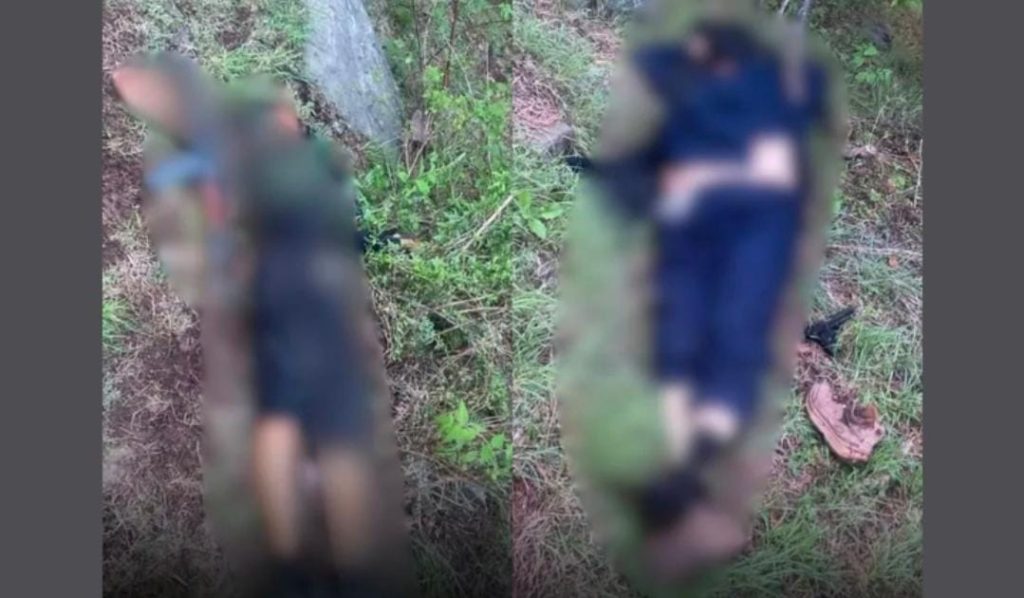
The two terrorists were killed on Wednesday in a heavy exchange of fire with security forces in Jammu and Kashmir’s Baramulla by the Indian Army. The encounter broke out when around two-three terrorists tried to infiltrate through general area of Sarjeevan at Baramulla’s Uri Nala.
The operation, launched by Indian Army’s Chinar Corps, also led to the recovery of a large cache of weapons, ammunition, and other war-like stores. The area is being combed for more infiltrators, and operations remain underway.
LeT-linked organisation The Resistance Front claims responsibility
The Resistance Front (TRF), a proxy of the banned Pakistan-based terror group Lashkar-e-Taiba (LeT), claimed responsibility for the attack. The organisation is backed by Pakistan’s intelligence agency ISI. The Resistance Front is allegedly linked to the banned Lashkar-e-Taiba (LeT). The outfit is considered a proxy of LeT founder and 26/11 mastermind Hafiz Saeed.
TRF a terrorist organization: Govt of India
According to the Ministry of Home Affairs, TRF “has been involved in the planning of killings of security force personnel and innocent civilians of Jammu and Kashmir, co-ordinating and transporting weapons to support proscribed terrorist organisations, recruitment of terrorists, infiltration of terrorists and smuggling of weapons and narcotics from across the border.”
The Government of India formally designated TRF as a terrorist organization under the UAPA in the year 2023. This move allowed for stronger surveillance and crackdowns on its operations and associates.
The National Investigation Agency (NIA) and other central agencies have intensified their efforts to dismantle the group’s operational infrastructure.
All About ‘The Resistance Front’ (TRF) Terror Group Behind Pahalgam Terror Attack
In one of the deadliest civilian attacks in recent years in Jammu & Kashmir following the 2019 Pulwama attack. At least 28 tourists were killed and several others injured in a terrorist strike in Pahalgam.
One of the worst attacks on civilians in Kashmir since the abrogation of Article 370. The incident took place at the Pahalgam’s Baisaran meadows in Anantnag district on Tuesday. An Indian Navy officer and an Intelligence Bureau personnel were also killed in the attack.
The Resistance Front’s statement
According to reports, The Resistance Front (TRF), a terror outfit, has claimed responsibility for the massacre in Pahalgam. The organisation is backed by Pakistan’s intelligence agency ISI. The Resistance Front is allegedly linked to the banned Lashkar-e-Taiba (LeT). The outfit is considered a proxy of LeT founder and 26/11 mastermind Hafiz Saeed.
“More than 85,000 domiciles have been issued to non-locals, creating a pathway for demographic change in Indian-occupied Jammu & Kashmir (IIOJK). These non-locals arrive posing as tourists, obtain domiciles, and then begin to act as if they own the land. Consequently, violence will be directed toward those attempting to settle illegally,” TRF said.
What Is The Resistance Front (TRF)?
The Resistance Front (TRF) was allegedly formed in October 2019. The formation of TRF came shortly after the Indian government’s abrogation of Article 370 and the revocation of Jammu and Kashmir’s special status in August 2019.
The organisation is widely regarded as a proxy or rebranded offshoot of Lashkar-e-Taiba (LeT). Lashkar-e-Taiba is the Pakistan-based jihadist group responsible for the 2008 Mumbai terror attacks. The Indian security agencies and intelligence sources confirm TRF was created to give Kashmir militancy a more “indigenous” and “secular” face. The organisation deliberately distanced itself from the overtly Islamist branding of groups like LeT and Jaish-e-Mohammad.
Leadership and Key Figures
Individuals with known associations with Lashkar-e-Taiba (LeT) lead the TRF. This includes Sajjad Gul, Salim Rehmani, and Sajid Jatt. Sheikh Sajjad Gul, a key commander, has been designated a terrorist under India’s Unlawful Activities (Prevention) Act (UAPA) list. Not just that he is also on the National Investigation Agency’s (NIA) most-wanted list, with a bounty on his head.
TRF’s Tactics and Activities
Terrorism, Infiltration & Narcotics Smuggling
TRF has been actively involved in a range of terrorist activities, including:
-
Targeted killings of civilians, including religious groups like Kashmiri Pandits and Sikhs.
-
Attacks on Indian security forces and local police.
-
Recruiting youth through online radicalization.
-
Smuggling of narcotics and weapons from across the Pakistan border.
-
Coordinating logistics and transportation for other banned terror outfits.
According to the Indian security agencies, the group uses guerilla warfare strategies. The organisation has been tied to deadly ambushes like the one in Kupwara’s Keran Sector in April 2020. In this incident over five Indian soldiers and five TRF terrorists were killed in a prolonged gun battle.
Why TRF Was Created: A Strategic Rebranding
According to counter-terrorism experts, the creation of TRF served multiple strategic purposes:
-
By distancing itself from religious nomenclature, TRF helps Pakistan avoid censure from international watchdogs like the Financial Action Task Force (FATF).
-
The term, “Resistance” is a globally resonant term. It is often associated with indigenous freedom struggles, which Pakistan uses to project the Kashmir insurgency as a local movement, even though its support is largely foreign-backed.
-
TRF uses secular symbols and language; its activities and affiliations make it clear that it is an Islamist militant organization. It targets not only state institutions but also religious and ethnic minority groups.
-
An official, as per an Indian Express report said, “Lashkar and Jaish-e-Mohammad had religious connotations and Pakistan did not want that. They wanted to make Kashmir militancy appear indigenous. Hence, they opted for ‘Resistance’ – that has some currency in global politics – in its name”
Designation and Crackdown
According to the Ministry of Home Affairs, TRF “has been involved in the planning of killings of security force personnel and innocent civilians of Jammu and Kashmir, co-ordinating and transporting weapons to support proscribed terrorist organisations, recruitment of terrorists, infiltration of terrorists and smuggling of weapons and narcotics from across the border.”
The Government of India formally designated TRF as a terrorist organization under the UAPA in the year 2023. This move allowed for stronger surveillance and crackdowns on its operations and associates. Furthermore the National Investigation Agency (NIA) and other central agencies have intensified their efforts to dismantle the group’s operational infrastructure.
पहलगाम आतंकी हमले में मारे गए 26 लोगों में सबसे ज्यादा महाराष्ट्र के
Pahalgam Terror Attack: जम्मू-कश्मीर के पहलगाम में मंगलवार को हुए आतंकवादी हमले में 26 लोगों की मौत की पुष्टि हो गई है। लोकल पुलिस ने आतंकिय़ों के हमले में मारे गए लोगों की मौत की सूची जारी की है। आतंकी हमले में सबसे ज्यादा जान गंवाने वाले लोगों में महाराष्ट्र से हैं। महाराष्ट्र के 6 पर्यटकों की मौत हुई है। वहीं गुजरात-कर्नाटक के 3-3 लोगों को मौत हुई है। वहीं छत्तीसगढ़ के कारोबारी दिनेश मिरानिया की भी गोली मारकर हत्या कर दी। आतंकियों ने इस हमले में सिर्फ पुरुषों पर ही हमला किया। आतंकियों ने वहां मौजूद लोगों ने धर्म पूछा और कलमा पढ़ने को कहा और गोली टारगेट किलिंग करते चले गए। आतंकियों के निशाने पर विशेषकर हिंदू रहे। आतंकियों ने हिंदुओं को चुन-चुनकर किसी के सिर तो किसी के सीने में गोली मारी।
महाराष्ट्र के 6 लोगों की मौत
इस आतंकी हमले में महाराष्ट्र के 6 लोगों की मौत हो गई। हेमंत सुहास जोशी और संजय लक्ष्मण लाली मुंबई के रहने वाले थे। जबकि अतुल श्रीकांत मोनी, संतोष जागड़ा, कस्तुबा गान्वोते भी महाराष्ट्र के रहने वाले थे। आतंकी हमले में इंदौर के सुशील नथानियल की भी मौत हो गई है। वह अपनी पत्नी का जन्मदिन के लिए कश्मीर मनाने गए थे। सुशील एलआईसी के ब्रांच मैनेजर थे।
गुजरात के 3 लोगों की मौत
गुजरात के 3 लोगों की मौत हो गई है. इसमें पिता-पुत्र भी शामिल हैं। गुजरात के भावनगर के रहने वाले यतेश परमार और उनके बेटे सुमित परमार की मौत हो गई है। इनके अलावा सूरत के शैलेष भाई हिम्मत भाई कलाथिया भी मारे गए हैं। आतंकी हमले में महाराष्ट्र और गुजरात के अलावा छत्तीसगढ़, उत्तर प्रदेश, उत्तराखंड, पश्चिम बंगाल, हरियाणा, ओडिशा, केरल, चंडीगढ़, कर्नाटक और अरुणाचल प्रदेश से भी लोग मारे गए हैं।
Pahalgam Terror Attack: हाथ में AK-47 थामे ताबड़तोड़ फायरिंग, कैमरा लगा हेलमेट पहने हुए था
हमले में बचे लोगों ने बताया कि हमलावरों ने सिर्फ पुरुषों को निशाना बनाया और खास तौर पर हिंदुओं से जबरन कलमा पढ़वाने की कोशिश की। जो नहीं पढ़ पाए, उन्हें गोली मार दी गई। महाराष्ट्र के पुणे से पहलगाम घूमने आई आसावरी के पापा को आतंकियों ने उनके सामने ही तीन गोली मारी। हमले में बचकर निकली पल्लवी के मुताबिक आतंकी हिंदुओं को निशाना बना रहे थे और तीन-चार लोगों ने पर्यटकों पर हमला किया था। पल्लवी ने बताया, ‘मैंने उनसे कहा- मुझे भी मार दो, तुमने मेरे पति को पहले ही मार दिया है, उनमें से एक ने कहा, ‘मैं तुम्हें नहीं मारूंगा, जाओ मोदी को ये बता देना।
Tragedy in Pahalgam: Three Tourists from Bengal, Including IB Officer, Killed in Terror Attack
In a horrifying terror attack that shook Kashmir’s picturesque Baisaran meadow in Pahalgam, Pakistan-based terrorists opened fire on a group of tourists on Tuesday, killing 26 people and injuring several others. Among the deceased were three individuals from West Bengal, including an Intelligence Bureau (IB) officer posted in Hyderabad.
Victims Identified: Bengal Mourns Its Lost Sons
The three victims from West Bengal have been identified as Samir Guha, Bitan Adhikari, and Manish Ranjan. Guha and Adhikari hailed from Kolkata, while Ranjan, originally from Jhalda in Purulia district, was serving with the IB in Hyderabad.
Adhikari, a 40-year-old tech professional based in Florida, was in Kolkata on vacation and had embarked on a family trip to Kashmir on April 16 with his wife Sohini and three-year-old son. They were scheduled to return home on April 24.
Ranjan, the IB officer, had also gone to Kashmir with his family. His sudden death has cast a shadow of mourning over his hometown, Jhalda, where his elderly parents were informed of the tragedy by local authorities.
Devastated Families Recall Their Last Conversations
Dipak Adhikari, Bitan’s brother, shared the pain of hearing the news shortly after speaking to Bitan on Tuesday morning. “He had invited me to join them on the trip. I declined and even advised them against pony rides in the hills,” he recalled with a heavy heart. “What will I tell Bitan’s son now? He’s just a child. We are all shattered.”
Samir Guha, a central government employee, had also travelled to Kashmir on April 16 with his wife and daughter. The family was to return on April 23. Guha’s brother-in-law, Subrata, said the two survivors are in shock. “My sister and niece were unharmed, but they are traumatised. I just want them back home safe,” he said.
According to Subrata, their driver Md Iqbal took the family to his home after the attack, offering them shelter and support before help arrived.
State Government Steps In: Mamata Banerjee Assures All Assistance
West Bengal Chief Minister Mamata Banerjee expressed deep sorrow over the incident and assured full support to the bereaved families. She personally spoke to Sohini Adhikari and later posted on X:
“One of the victims, Sri Bitan Adhikari, is from West Bengal. I had spoken to his wife over the phone. Though no words are enough to console her in this hour of grief, I have assured her that my government is taking all steps to bring back his mortal remains to his house at Kolkata.”
State Minister Arup Biswas also visited Adhikari’s residence in Baishnabghata to offer condolences and oversee arrangements being made for the family’s return.
A Nation in Mourning, a Homeland Under Threat
The attack, which has left the nation in shock, raises fresh concerns about the safety of tourists and the continuing threat of cross-border terrorism in Jammu and Kashmir. Security has been heightened in the region, and investigations are underway to identify and neutralise those behind the attack.
As Kashmir reels from yet another episode of senseless violence, the grief of the families in Kolkata and Purulia underscores the far-reaching pain inflicted by terrorism,a pain that transcends geography and speaks to the human cost of conflict.
Kashmir and Jammu Observe Shutdown After Deadly Pahalgam Terror Attack
In an unprecedented show of unity and grief, Jammu and Kashmir observed a complete shutdown on Wednesday in response to the brutal terrorist attack that claimed the lives of at least 26 people mostly tourists in the Baisaran area of Pahalgam, Anantnag district. The incident, which occurred on Tuesday, has triggered widespread outrage and led to the first valley-wide shutdown against terrorism in 35 years.
For the first time in 35 years, the Kashmir Valley observed a complete shutdown against a terror strike. Streets across Srinagar and other major towns were eerily quiet, with marketplaces, petrol pumps, and commercial establishments shuttered. Only essential services were available, and public transportation was largely absent. However, private vehicles continued to ply in limited numbers.
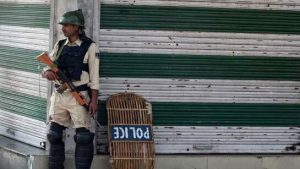
The call for the bandh came from a wide range of voices including trade associations, religious leaders, civil society, and mainstream political parties demonstrating a rare, unified rejection of violence. The Kashmir Chamber of Commerce and Industry (KCCI), Kashmir Traders and Manufacturers Federation (KTMF), and Jammu’s Chamber of Commerce and Industry were among the key business bodies leading the call. The Jammu Bar Association also backed the shutdown, along with student organisations like the Jammu-Kashmir Students Association (JKSA).
Religious Groups Condemn the Attack
Religious organisations strongly condemned the killings. Mutahida Majlis Ulema (MMU), a coalition of various Islamic bodies led by Hurriyat’s Mirwaiz Umar Farooq, appealed for a peaceful strike, urging residents to express solidarity with the bereaved families. “The people of Jammu and Kashmir must peacefully stand against this atrocity,” said Mirwaiz.
Heightened security measures were immediately implemented across the region. Additional security forces were deployed at all major checkpoints, tourist hubs, and district headquarters. Officials confirmed that checkposts had been established and extensive frisking operations were being carried out. A sweeping search operation was also launched in the Baisaran region, with joint forces from the Army and Jammu and Kashmir Police looking to trace those responsible for the attack.
In Jammu, the impact of the bandh was equally visible. The shutdown was widely supported across the city and nearby towns, with major markets and public spaces remaining deserted. Arun Gupta, president of the Jammu Chamber of Commerce, stressed that the strike was a “clear message that terrorism has no place in our society.”
Many Schools, Colleges were Shut Down
The education sector also responded in solidarity. All private schools remained closed throughout the Valley, while government schools functioned with reduced attendance. Kashmir University announced the postponement of examinations scheduled for the day, aligning with the broader observance of the bandh.
Political leaders from across the spectrum voiced their condemnation of the attack and lent support to the shutdown. Former Chief Minister and PDP leader Mehbooba Mufti called the incident “an assault on the collective conscience of the people,” stating that the victims could have been “any of us.” She urged Kashmiris to unite in grief and protest peacefully. The National Conference, through its official social media channels, also appealed to people to make the bandh a “complete success.”
Prime Minister Narendra Modi, who cut short an official visit to Saudi Arabia in response to the tragedy, denounced the attack and assured the nation that the perpetrators would be brought to justice. Union Home Minister Amit Shah chaired a high-level security meeting and traveled to Kashmir the same day to assess the situation firsthand.
The united response from both regions across political lines, communities, and institutions underscored a powerful and emotional message: the people of Jammu and Kashmir are fed up with violence and are now speaking in one voice against terrorism. The bandh served not just as a protest, but as a collective act of mourning, resilience, and defiance against forces that seek to destabilise peace.
Pahalgam Terror Attack: Families of Victims, Survivors Plead in Front of Home Minister Amit Shah
The families of the victims and the survivors brokedown in front of Union Home Minister Amit Shah. This comes during Shah’s visit in Pahalgam on Wednesday following the deadly terror attack. During the visit Shah met with the families of the victims of the Pahalgam terror attack at the police control room in Srinagar.
#WATCH | Srinagar | Union Home Minister Amit Shah and J&K LG Manoj Sinha meet the families of Pahalgam terror attack victims pic.twitter.com/vJ73eeRyVC
— ANI (@ANI) April 23, 2025
The grieving relatives broke down in front of the Home Minister. The families pleaded for justice and demanded that the loss of their loved ones not go in vain. Shah, who arrived in Srinagar within hours of the attack to pay tribute to the deceased. Shah claimed at least 28 lives, laid wreaths on the coffins of the slain victims in a sombre ceremony.
PM Modi asks Amit Shah to visit site
He also met with survivors of the attack and expressed deep sorrow over their pain. In a post on X earlier he said, “Those involved in this dastardly act of terror will not be spared, and we will come down heavily on the perpetrators with the harshest consequences”.
#WATCH | Union Home Minister Amit Shah arrives at Baisaran meadow, the site of the Pahalgam terror attack pic.twitter.com/i9f6muLgTq
— ANI (@ANI) April 23, 2025
Earlier, PM Modi spoke to Home Minister Amit Shah over the phone about the Pahalgam terror attack and asked him to take all suitable measures. He also asked him to visit the site of the attack.
Pahalgam Terror attack: At Least 28 dead
The Phalgan Terror attack is the most devastating incident in Jammu and Kashmir since the 2019 Pulwama attack. One of the worst attacks on civilians in Kashmir since the abrogation of Article 370. The incident took place at the Pahalgam’s Baisaran meadows in Anantnag district on Tuesday.
The attackers reportedly emerged from nearby forests and opened fire on a group of tourists. Heavily armed terrorists opened fire on a group of mostly non-local tourists. Initial reports indicate that the victims were selectively targeted based on their religion. The men were separated from their families before being gunned down. Some were shot in front of the family members. The trekking in the scenic meadow is accessible only by foot or pony.
Amit Shah Meets Survivors, Vows Maximum Support
Amit Shah visited the injured victims of the Pahalgam attack at the Srinagar Medical College Hospital on Wednesday. Shah met with families of the deceased and assured them of full government support, including medical assistance, compensation, and long-term rehabilitation.
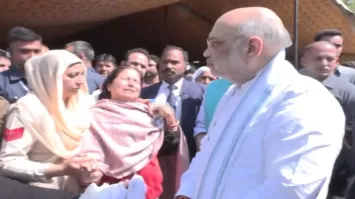
Shah while speaking to the media said, “The pain of the victims and their families is beyond words. The government stands firmly with them. The perpetrators of this cowardly act will be hunted down and punished with the severest action.”
According to reports, The Resistance Front (TRF), a proxy group of the banned Pakistan-based Lashkar-e-Taiba (LeT), has claimed responsibility for the attack. However, an official confirmation from the government is still awaited.
PM Modi Cuts Short Saudi Visit, Chairs Emergency Meeting
Prime Minister Narendra Modi, who was on an official trip to Saudi Arabia, canceled his trip and returned to India early Wednesday. The Pm called for an emergency meeting at the Delhi airport with National Security Advisor Ajit Doval and External Affairs Minister S. Jaishankar. He was briefed on the ground situation and security response in Jammu and Kashmir.
